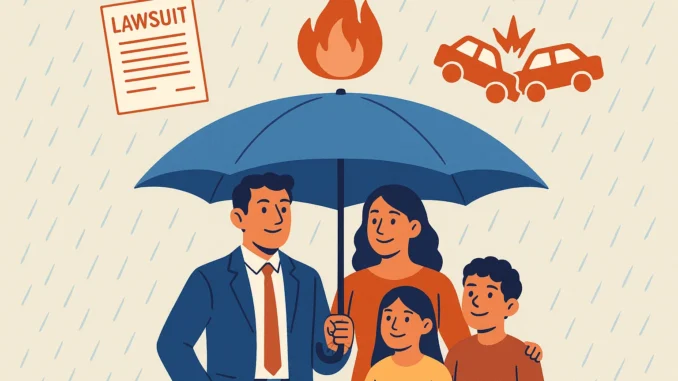
Umbrella insurance provides extended liability coverage that steps in when your home or auto policy limits are exhausted. It protects your finances from large lawsuits and unexpected claims, acting as a financial shield for your assets and future income.
What Is Umbrella Insurance?
This is a personal liability policy designed to provide additional protection once your primary insurance—such as homeowners insurance or auto coverage—reaches its limit.
Example Scenario
Suppose you’re responsible for a serious car accident, and the damages total $900,000. If your auto insurance covers only $300,000, you’re left with a $600,000 gap. This coverage can handle the rest, saving your savings and property from lawsuits.
What Does umbrella insurance Cover?
umbrella insurance includes a wide range of liability risks:
- Bodily injury to others
- Property damage you cause
- Landlord-related liability claims
- Legal defense costs
- Defamation: libel, slander, etc.
- False arrest or wrongful eviction
This isn’t just for accidents—it also helps cover expensive lawsuits that can arise from online or personal conduct.
What umbrella insurance Doesn’t Cover
Even this broad form of protection has exclusions. It won’t pay for:
- Your own injuries or property damage
- Intentional or criminal acts
- Business liability without specific coverage
- Contract disputes
For business protection, consider commercial insurance instead.
Who Should Consider This Coverage?
It’s useful for more than just high-net-worth individuals. You may benefit from this policy if you:
- Own a home or rental property
- Have teen drivers in your household
- Own pets that could injure others
- Are active online or on social media
- Have substantial savings or investments
If you rent out property, this coverage complements your landlord insurance.
How Much Do You Need?
Most umbrella insurance plans start at $1 million, but coverage can go much higher.
To estimate what you need, consider:
- Your total assets and savings
- Your liability exposure (vehicles, properties, pets, etc.)
- Your income potential, which could be garnished in a lawsuit
Aim for a limit that at least matches your net worth.
How Much Does umbrella insurance Cost?
Despite its high coverage, this protection is affordable:
- $1 million in coverage: around $150–$300 per year
- Additional coverage: about $75–$100 per extra million
Rates depend on:
- Driving history
- Number of properties and vehicles
- Number of household members
Bundling with your home or auto provider can help reduce premiums.
umbrella insurance Pros and Cons
✅ Pros
- Affordable for large coverage amounts
- Extends liability protection across policies
- Includes defense costs and non-physical lawsuits
❌ Cons
- Doesn’t cover your own damages
- Not for business risks without special riders
- Requires minimum base liability limits
How to Get This Protection Plan
To buy a policy:
- Check eligibility: Most insurers require at least $250,000 in auto liability and $300,000 for home.
- Compare quotes: Try providers like State Farm, Allstate, GEICO, and Progressive.
- Bundle your policies to save more.
- Understand exclusions and specific policy terms.
Visit the NAIC’s official site to read more about policy rules and coverage types.
Final Thoughts
This liability extension is a smart, affordable way to protect your future. Whether you’re a landlord, pet owner, or homeowner with savings to protect, this coverage ensures you don’t lose everything in one bad accident or lawsuit.

Leave a Reply